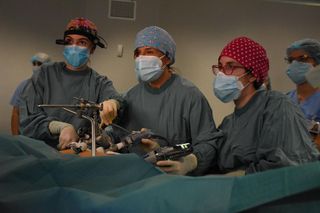- This 2021-2022 academic year, UVic-UCC’s Faculty of Medicine has launched the Student Support Programme (SSP), which provides academic and emotional support to students who need it
- The support is provided through personalised tutorials, in which possible shortcomings in the management and organisation of work, in study techniques and in adaptation to the teaching methodology are analysed
Am I good enough to take the degree in medicine? What will happen if I do not pass the subjects? Will I pass the MIR (Resident Medical Intern) exam when the time comes? These questions, often arising from unfounded but at the same time natural anguish, are posed by all UVic-UCC medical degree students at one time or another. To access these studies, students need to obtain very high marks in the PAU (university entrance exam), which range from 12 to 14. The degree lasts six years, with a two-year basic stage and a four-year clinical stage, very intensive in clinical practice. Furthermore, the requirement to take the MIR exam after graduating to obtain a speciality also conditions the competitiveness of students, which is why last year the faculty began the MIR Preparation Programme.
Given this reality and to move beyond the student support already provided by the teachers, the subject and stage coordinators and heads of studies, this 2021-2022 academic year UVic-UCC’s Faculty of Medicine has launched its own Student Support Programme (SSP). Its aim is to meet any needs, especially academic and emotional, that might arise while pursuing the degree of medicine, which is highly demanding. Ramon Pujol, Dean of the Faculty of Medicine, explains that “creativity for new educational methods, innovation in teaching and assessment, rigour in organisational approaches, mutual respect, confidence in the objectives and concern to generate knowledge have been values that have accompanied the progress made by the faculty since its creation five years ago”.

Helping to improve academic performance
The central element of the Student Support Programme is the tutoring of students. This consists of identifying the needs of each student and offering them personalised support, mostly academic, to help improve their performance through advice on the study methodology and planning, time management and so forth. All the medical students of the clinical stage, i.e. from the third year onwards, are assigned a tutor of clinical practice from the faculty teaching staff who acts as both a tutor and a mentor if the student and SSP team consider it opportune. First and second year students, i.e. basic stage students, are also assigned a tutor, if they so require, who will monitor them until they are transferred to the third year tutor.
The Faculty of Medicine’s programme is part of the UVic-UCC Student Support Programme and adapts it to their specific needs, based on the concept of an inclusive university that takes care of students by making available to them measures that guarantee their wellbeing. Students who would like further details about this programme and to participate in it can send an email to suport.estudiant@umedicina.cat.

An integral accompaniment
When required, the Medical Student Support Programme refers students to specialised services such as the SAEDF, the Uvic-UCC Servei d’Atenció a l’Estudiant amb Diversitat Funcional (Student Functional Diversity Care Service). In such cases, any disability, functional diversity and learning disability that may exist is attended to. Students may also be referred to the university’s specialised services for specific psychological and pedagogical support.
This year’s novelty is the emotional and psychological support that in Medicine is provided through the pilot programme for undergraduate students with Fundació Galatea, that has 20 years of experience in mental health care for doctors and, subsequently, other health and social professionals. “We are starting a specific programme for medical students that consists of making an early diagnosis of warning signs of emotional, psychological and psychiatric disorders they may have, and of monitoring them with resources of the ordinary mental health network”, explains Marina Geli, director general of the Faculty of Medicine. “With this programme we wish to provide comprehensive support to students that need it to improve their academic and integral journey”, Geli emphasises. The Fundació Galatea is launching the programme at UVic-UCC together with the faculties of medicine of the University of Barcelona, the Autonomous University of Barcelona and the University of Rovira i Virgili.
«Meeting with students and offering them personalised advice provides them with academic and emotional benefit»
Interview
Cristina Cruz and Irene Veganzones are the coordinators of the Faculty of Medicine’s Student Support Programme, for students of the basic stage (1st and 2nd year) and of the clinical stage (3rd, 4th and 5th year), respectively. They tell us why they chose to launch the programme and how it helps the students.

Until now, was there no such resource in the Faculty of Medicine?
CC: There was no programme specifically designed as the SSP-Medicine that we coordinate is. But the teaching staff has always met the needs of the students, especially their academic needs, on demand and from the first year of the basic stage.
IV: With regard to students in the clinical stage, when they reach the third year they are assigned a tutor who monitors them personally, not only in their clinical practice but also their academic development throughout the clinical stage. Last year the MIR preparation programme was also launched in which, from the third year onwards, the PEM (Multiple Choice Questions) exam technique is covered in a seminar format.
What needs were found that led to the creation of the SSP?
CC and IV: The teaching staff saw that some of the first- and second-year students found it difficult to adapt to the teaching methodology of the degree in Medicine, to develop good study techniques, and to enhance learning. In some cases, this situation generated some discouragement, and even vocational doubts and low academic performance, which further increased frustration. At the same time, we saw both the academic and emotional benefits of meeting and advising students in a personalised way.
What are the most frequent reasons for consultation or problems encountered by students?
CC: In the first and second year, the most common are the student’s concern about passing the subjects, the feeling of frustration if they fail the exams, and the need for improvement in time management and quality of study skills.
IV: In the clinical stage, we help mainly in the planning of the subjects for students that have previous courses to make up or who join from other universities. We also help those that have to combine their studies with other obligations and that, therefore, have to re-organise their work plan. However, most queries are from students who feel they are not getting the expected result from the time spent studying.
Once the analysis of the possible causes of this low performance has been made, we detect the existing errors, which can be found, for example, in the organisation and prioritisation of the syllabus, the quality of the study material, the study techniques or exam technique. We do not usually detect a lack of interest or situations in which more hours of study are required because medical students are usually very committed.
Why do you think students are anxious or stressed?
CC: Changes are potential sources of anguish. Starting university involves a change in both the teaching methodology and the level of academic rigour. In some cases, there are additional changes, such as residence or language. The students need time to make the adjustment, both in terms of time organisation and in terms of their study techniques.
IV: The system of evaluation is also completely new to them. The exams are longer and more complex than what they were used to. Added to this is the fact that they are usually brilliant students, and it is not east to maintain the level of their secondary school marks, and this can lead to frustration and anguish. In the clinical stage they are more used to the methodology and the exams, but it is not uncommon for them at some point to notice the toll and cost of maintaining the high level and results. In addition, in the later years they also have to live with the pressure of the impending MIR exam, which is decisive for their professional future.
How are these tutorials done?
CC and IV: In the individual tutorials, in a first interview, in person or online, the situation is discussed and after assessing it, a personalised plan is established. It therefore varies depending on the needs of the student, and it always encourages their development and autonomy.
In the clinical stage, group tutorials are usually scheduled after the exams to review how both the organisation of the study and the exam itself went. If particular needs are detected in this group tutorial, any individual tutorials required are agreed upon.
Students that have already used the SSP

“I went to the SSP-Medicine because last year was too much for me. I had just moved from another university, and it was very difficult for me to adapt to the faculty curriculum, which was very new to me. I didn’t know how approach the exams and no matter how much I studied, I didn’t feel ready to take them. The programme helped me try new study methods and as a result I have been trying them out. Although I’m still trying to find out what’s right for me, I’ve improved a lot in my studies.”
Second-year student when doing the tutorials

“I wanted to improve my academic record, especially for the MIR, to be able to have access to the position I want. I didn’t know what was wrong that kept me from getting better grades – whether it was the study method, how to answer the exam, etc. The programme helped me to find out that the study method was fine and that with a few modifications I could improve, for example by making my own notes and focusing on what was important instead of using the commissioned notes, since they change a lot depending on the person making them. I thoroughly recommend the programme.”
Patrícia Sainz, fifth-year student

“When I was doing my internship, my tutor told me that with the help of the team I could manage and plan the year to get the best results and feel better about what I was doing. My main problem was related to the overlap of subjects, answering exams, prioritising and dividing the syllabus, and adapting to problems outside the faculty. The SSP-Medicine helped me to see things from another perspective, it gave me advice and enabled me to gain personal experience. I received very personal attention, with close involvement of the team. I’ve changed my daily study routine and the way I approach exams, but the process continues every day. In fact, it’s still very useful to me today.”
Fifth-year student

“Currently, due to personal and work circumstances, I have little time to study, which has always affected my exam results. I needed help to focus on organisation and efficiency in studying the subjects and also needed to improve my exam technique when taking the multiple-choice PEM exams. The programme helped me to perfect my technique in the exams and in the organisation and optimisation of time on the most important aspects of study. I found out about the programme from my tutor and would unreservedly recommend it.”
Fifth-year student